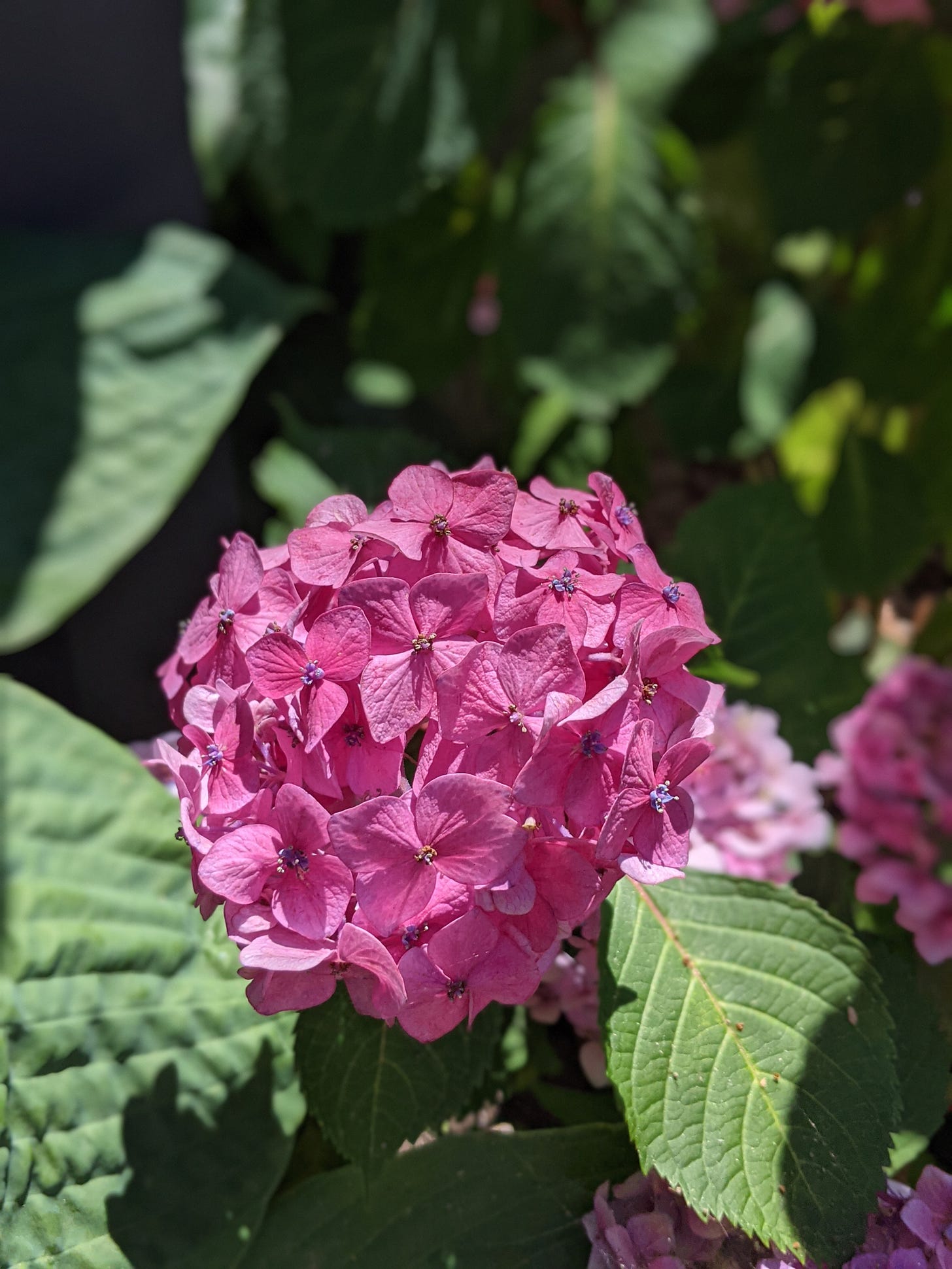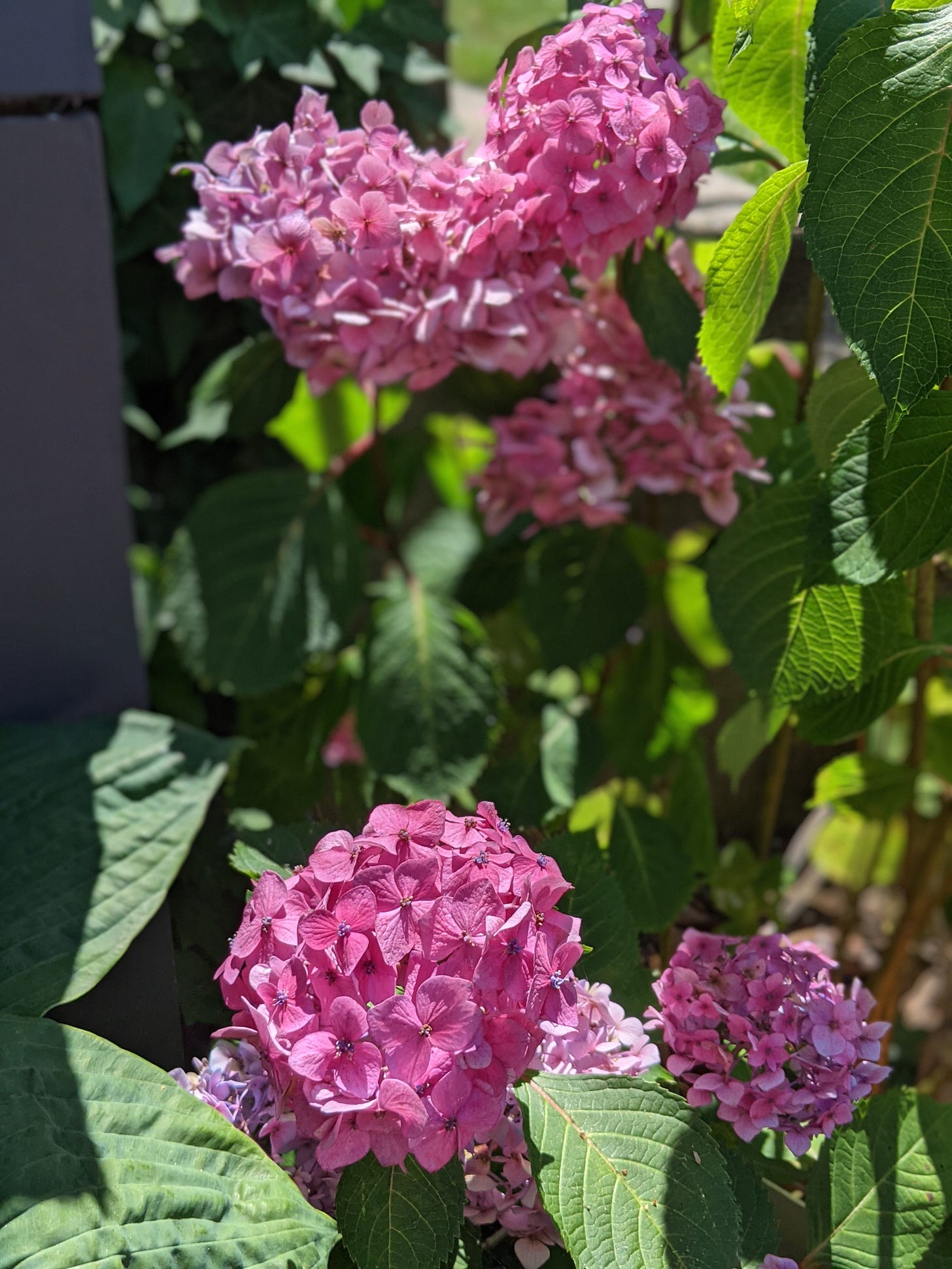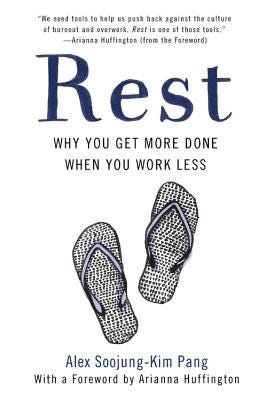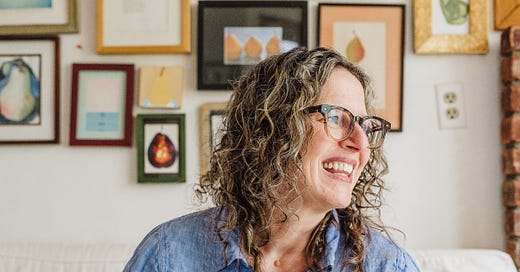

Discover more from Write More, Be Less Careful
Hi, all. How are you holding up? It’s been brutally hot here in New Jersey, and somehow it’s July already, which is when I start worrying about the summer flying by too fast. My brain feels like a little cooked egg. I framed the photo above to capture our hydrangea’s gorgeous blooms, but in truth, I feel more like the wilty blooms I cropped out.
I have a few words on rest today and how taking a break can actually be good for your creative process. The relationship between creativity and productivity is one of my ongoing obsessions, and it’s so easy to feel like the answer is just work more, work harder, work smarter, work better, find a new hack. I’ve been reading Alex Soojung-Kim Pang’s Rest: Why You Get More Done When You Work Less, and he suggests an alternate approach: serious rest, which can both stimulate creativity and restore creative energy.
The rest he’s talking about here isn’t just zoning out (though I’d argue there’s definitely space in a creative life for instagram scrolling!) but deliberate rest, activities that restore and enrich creative life. He mentions the long walks and rigorous exercise routines taken up by many writers. One example that particularly stuck with me is Virginia Woolf’s observation that the dons at England’s ancient colleges (in comparison with the newer and poorer women’s colleges) were able to accomplish more specifically because they had more resources that allowed them a more leisurely pace that allowed for long walks and conversation. Pang’s book begins with daily routines that include rest and then describes longer periods of rest, all the way up to sabbaticals and long trips.
I’ll write more about the book, and about how rest can sustain your writing life, in the future (I haven’t finished the book yet! I thought about rushing through it so I could give you all a full accounting of it, but that seemed to run counter to the whole project of rest), so for right now, I’ll share one snippet:
If you recognize that work and rest are two sides of the same coin, that you can get more rest by getting better at it and that by giving it a place in your life you’ll stand a better change of living the life you want, you’ll be able to do your job, and your life’s work, better.
One of the things I like about Pang’s approach to rest is his insistence that rest is active. Running and walks have long been important to me, and I’ve found that movement often helps me get unstuck when I’m writing. I also love big cooking projects, the kind of work that really engages my full attention. What forms of deliberate rest have you made space for in your life?
notes and reading suggestions:
Elizabeth Held’s What to Read If newsletter offers great reading recs and interviews with authors, and she’s currently running a summer reading bingo!
I loved Jess Zimmerman’s wisdom on vulnerability and the personal essay when she first published it in her newsletter, and Catapult just published an expanded version: A Cow with a Hole in It. Here’s a snippet, and I promise the whole cow thing will make more sense when you read the whole essay:
When editors ask you to be vulnerable, what they really want is for you to be permeable, for the windows you place in your defenses to offer a sense of the area beyond. The walls don’t need to be breached, and they don’t need to come all the way down in a way that puts you in danger. Hence our guiding light, the cow with a hole—who is in no danger at all, but whose innards are in easy reach for those who need to understand them. Putting a cannula in a cow is not opening the cow up to further damage; it’s surgery-level safe, unlike all usual ways of putting a hole in a cow, and it only reveals what it needs to reveal. But it makes the cow penetrable, so that some things that might otherwise be mysteries can be investigated directly.
Writing can be so hard and lonely, and some of what’s made it hardest for me in recent years is the idea that I’ve gotten to a place where I should be able to do it on my own. But that’s not how this works! So I always appreciate it when writers talk about the help they’ve sought out, and I wanted to share this bit from a recent Culture Study newsletter, in which Doree Shafrir describes hiring Carrie Frye to help her work on her book Thanks for Waiting after she’d gotten some really tough feedback from her editor:
I went through another few months of barely being able to write anything and was getting despondent, to the point where I seriously considered ripping up my contract and sending back my advance. Then, in what seemed to be a total Hail Mary, I emailed Carrie Frye, the former Awl editor who now runs her own independent editorial company, and asked if she would be willing to help me resuscitate this book. She said she’d love to, but that she only had something like six weeks over the summer to work on it with me. So we devised a plan: I would send her the whole manuscript, she would read it and send me an editorial memo, and then I would revise it in chunks and send them to her and she would respond with additional editorial memos on the revision chunks, and we had a call every week about her memos and what I was working on.
And it was… ridiculous? I do not recommend it. I basically rewrote the entire book in six weeks, then did another revision on my own, and sent it to my editor, Sara Weiss. Then Sara and I went through three, or maybe four, rounds of revisions, which was also a grueling process because by this point I was extremely late. Sara really pushed me to be more vulnerable and open in the book, and also had some really smart structure suggestions, and I had to turn in the draft that was going to go to copy edits in mid-January, and then my husband got COVID.
Anyway, this is all to say, it turned out that I needed Carrie’s handholding to get a complete draft to send to my editor, and I learned that that’s okay! As someone who has typically not been great at asking for help when it comes to work stuff, this was a really good lesson for me to learn.
See! Even someone who’s a very accomplished writer and editor, who’d already published a novel needed help! Help is good and okay, in writing and everything else. (I’m writing this to myself as well!)
How do you rest? What have you learned about how rest sustains your creative life? You can always reply to this email, or find me on twitter (@nancy_reddy) and instagram (@nancy.o.reddy).
Subscribe to Write More, Be Less Careful
why writing is hard & how to do it anyway














Also, I just subscribed to Elizabeth's newsletter and looking forward to playing the summer book bingo. What fun!
I just ordered "Rest" from my library. Feels very necessary, esp. as we begin to pull ourselves from a different kind of living over the past year and a half.